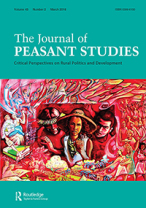
By Joan Martinez-Alier, Leah Temper, Daniela Del Bene, Arnim Scheidel
Abstract
One of the causes of the increasing number of ecological distribution conflicts around the world is the changing metabolism of the economy in terms of growing flows of energy and materials. There are conflicts on resource extraction, transport and waste disposal. Therefore, there are many local complaints, as shown in the Atlas of Environmental Justice (EJatlas) and other inventories. And not only complaints; there are also many successful examples of stopping projects and developing alternatives, testifying to the existence of a rural and urban global movement for environmental justice. Moreover, since the 1980s and 1990s, this movement has developed a set of concepts and campaign slogans to describe and intervene in such conflicts. They include environmental racism, popular epidemiology, the environmentalism of the poor and the indigenous, biopiracy, tree plantations are not forests, the ecological debt, climate justice, food sovereignty, land grabbing and water justice, among other concepts. These terms were born from socio-environmental activism, but sometimes they have also been taken up by academic political ecologists and ecological economists who, for their part, have contributed other concepts to the global environmental justice movement, such as ‘ecologically unequal exchange’ or the ‘ecological footprint’.
How to cite
Martinez-Alier, Joan, Temper, Leah, Del Bene, Daniela, Scheidel, Arnim (2016) Is there a global environmental justice movement? The Journal of Peasant Studies. DOI: 10.1080/03066150.2016.1141198
Link
email hidden; JavaScript is required
email hidden; JavaScript is required
Keywords
environmental justice
ecological distribution conflicts
collaborative research
activist knowledge
EJatlas
environmental racism
environmentalism of the poor
climate justice
statistical political ecology

The project ENVJUSTICE has received funding from the European Research Council (ERC) under the European Union’s Horizon 2020 research and innovation programme (grant agreement No. 695446)